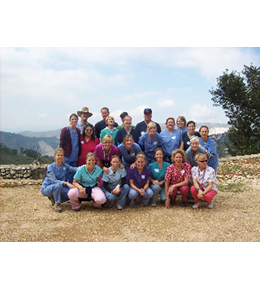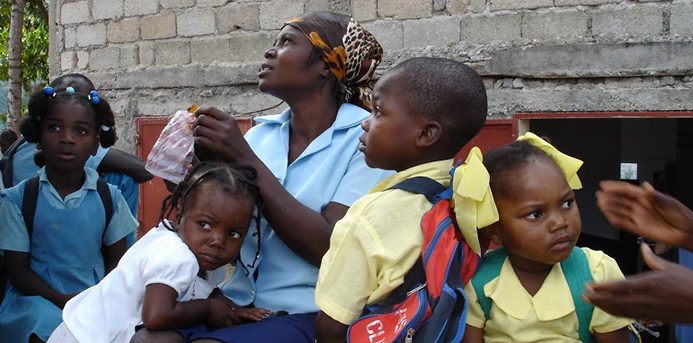 When the earthquake hit, suddenly everyone knew where Haiti was. But Sue Walsh and her organization, Little By Little, have known for a long time.
When the earthquake hit, suddenly everyone knew where Haiti was. But Sue Walsh and her organization, Little By Little, have known for a long time.
Sue describes her experiences helping people in Haiti post-quake in her new book, “Walking in Broken Shoes; A Nurse’s Story of Haiti and the Earthquake,” which she’ll read from on January 15 at the Book Stall. It collects the stories that stem from her medical mission trips. Shortly after the earthquake, Make It Better interviewed Sue about her experiences. The original article is below:
This month’s earthquake put a face on the poverty that has existed for years–long before television cameras transmitted images of destruction and chaos. The natural disaster added another challenge to daily living, on top of what was already a monumental struggle for the poorest residents of Haiti.
Little By Little, a Glenview-based mission group has been traveling to Gramothe, Haiti since 2006. It was founded by Sue and Brian Walsh and is comprised of a variety of volunteer medical staff & students and lay people and supported by local churches – particularly Glenview’s Our Lady of Perpetual Help (OLPH). The group of volunteers interviewed by Make It Better were delighted to explain that OLPH is the patroness of Haiti as well as the name of their beloved church.
 The group was hours shy of returning to Chicago when the January 12 earthquake hit. And for the almost-two dozen Chicago and North Shore residents that witnessed the crisis firsthand, their message to everyone is simple–do not despair and do not forget.
The group was hours shy of returning to Chicago when the January 12 earthquake hit. And for the almost-two dozen Chicago and North Shore residents that witnessed the crisis firsthand, their message to everyone is simple–do not despair and do not forget.
Helping Haitians is life-changing and fulfilling
“The first night after the earthquake, even nearby, there were people gathering in praise,” says Little By Little member Anne Unger. “You could dwell on the shock and horror and you could stay there, but these people were there remind you to elevate your spirit.”
Says nursing student Anna Arens, “It was a life-changing experience…it changes your whole outlook.” She too was impressed by the spirit of the people surrounding them, just hours after the quake hit. “It was complete blackness, a gorgeous sky, and a lit up church on a mountaintop.”
Little By Little mission “trippers” will tell you the experience, that for many took place prior to the earthquake, has been life-changing. In treating a Haitian with multiple skin infections, Coordinator of Integrative Services Patty Mulvihill says she has been deeply affected.
“This woman was so appreciative that I was taking care of her,” she says, and despite the language barrier, “there was unspoken communication of gratitude, love and humility.”
For group member Sparvim Navarof, the January trip was her first, and not her last. “I find myself thinking I can not wait to go back,” she says. “There’s so much need.”
 Group members also speak fondly of Richard and Melissa–two children suffering with severe burns to the face. At just 13, Richard would walk to the clinic–a five hour trek–for treatment.
Group members also speak fondly of Richard and Melissa–two children suffering with severe burns to the face. At just 13, Richard would walk to the clinic–a five hour trek–for treatment.
“His strength and determination to walk to the clinic,” says group member Kristen Borth, was nothing short of amazing, and made more so by the fact he made the trek alone.
Melissa, a toddler, suffered from massive burns to the face after her bedding caught on fire. Group members found her case to be especially dramatic in that Melissa’s mother considered abandoning her to the group, because she felt if she focused on her care, she would be unable to care for her newborn.
The group ultimately helped Melissa’s mother to ensure she could care for her, and on their next trip, were elated to see Melissa and her mother, fully bonded.
Hoping concern for Haiti isn’t short-lived
Because Little by Little was active in medical mission work prior to the earthquake, members can attest to the fact serious health and safety issues will not resolve themselves in the time it will take for the disaster to fade from our memory.
“It’s not going to change, and we need to make sure (the Haitians) are not forgotten,” says Navarof.
Says Little By Little member Elizabeth Murchie, “There is a very clear need for rescue care, but the issue is also sustainability. Their future well-being will not be any better than they were before, without thinking about the long term.
What you can do to help
Make a donation: Little By Little Director of Development Mary Mulhall says the easiest and most obvious option is money. One-hundred percent of monies donated go to work in Haiti–and with your donations, the group can parlay discounted supplies and stretch your dollar even further.
And consider donating on a regular, and not a one-time, basis. Nurse and teacher Dawn Ribnek offers this great suggestion: “Put a reminder to donate every six months in your Blackberry now.”
Become a fundraiser: Little By Little members often fan out into the community to host “Haitian Health Markets,” an educational initiative targeted at children and offering the opportunity to spend a few dollars to help purchase supplies for the medical mission and a result, often helping a Haitian child.
Food, clothing and supplies drives: When taking mission trips to the clinic in Gramothe, Little By Little members take 100 pounds of supplies each with them. The group is more than willing to work with you in determining what kind of drive may be best for an upcoming mission. Some of the more desired items include:
General Needs:
- Crocs footwear
- Baseball caps or visors
- Non-prescription sunglasses
- Non-prescription reading glasses
- Peanut butter
- Rice cereal
Items for “Haiti Health Packs”:
- Toothbrushes, toothpaste
- Bars of soap, washcloths
- Band-aids, antibiotic ointment
- Lubricating eye drops
- Over-the-counter pain relievers
- Chewable antacid tablets
- Re-sealable plastic bags
Practice patience: Walsh’s goal? “To help them help themselves,” she says, hoping there will be a day in which the Haitian villagers they serve are no longer in need of Little By Little’s services. “I can’t wait until they don’t need us anymore.”
Whether it’s teaching basic aspects of medical care or demonstrating sustainable farming methods, the point is to allow Haitians to continue to embrace their own culture and values, without imposing those from outside nations.
“The Haitians have incredible resiliencies and values,” says Murchie. “I heard someone say once, ‘I think when God was handing out strength, he gave Haitians an extra dose.'”
For more information on how to help or schedule a Haitian Health Market for your school or youth group, please visit http://www.littlebylittlehaiti.org/

